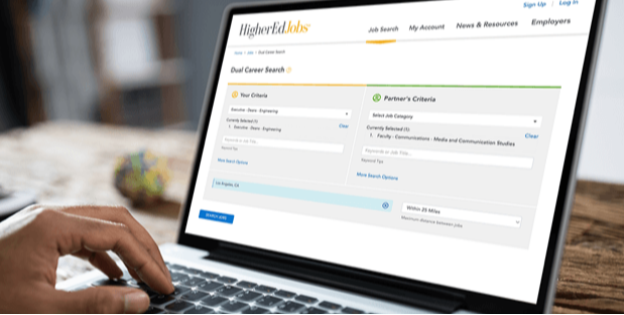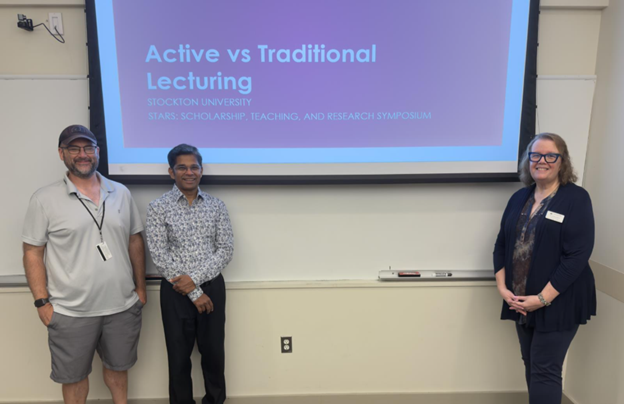For couples pursuing careers in higher education, there is a seemingly never-ending list of questions to consider during the job hunt. Will one institution hire us both? Will we need to relocate to a less desirable location in order for both of us to find employment? What happens if only one of us secures a position in academia and the other person is left without an offer?
Whether searching for faculty or staff positions, couples on the job hunt are often left feeling bewildered and exhausted by the prospect of finding roles at new institutions. They know that landing one job offer is only half the battle and the other half — finding meaningful employment for both partners at the same institution or within the same geographic area — can feel nearly impossible. And the search can be further complicated in situations where both parties are seeking tenure-track faculty roles in different disciplines.
However, by utilizing dual career search resources and employing a careful balance of patience, realism, flexibility and perhaps a touch of compromise, couples can arm themselves with additional tools to navigate the dual career search labyrinth.
“Dual career couples often need to compromise and remain flexible in their expectations, as it can be challenging for both partners to achieve their career goals within the same institution or community,” said Alicia Simon, dual career search coordinator at the University of Michigan. “Reaching a balance is typically a gradual process that requires patience, open communication, and mutual support.”
Even with patience and persistence, many couples are still faced with difficult decisions at the end of the process. For one job seeker engaged in a dual career search, that meant facing the unfortunate reality that the couple may need to live in different states, even if temporarily, so that each person can maintain their professional and personal goals, a story that is more commonplace in higher education than other fields of work.
“If you are undergoing a dual career search, you have to make sure the offer serves both parties to their satisfaction,” said the job seeker, who was granted anonymity due to the sensitive nature of the topic. “Don’t take [an offer] just because it was offered. If the offer isn’t great for both, it will never work in the long term.”
While experts agree there is no exact formula for a successful dual career search, there are some strategies that can help make the process less stressful. Here are four tips to consider as you embark on your search.
Use Resources to Your Advantage
If you are about to begin a dual career search, first check if your target institution has an office or point of contact who works with couples seeking roles in higher education. This is a resource that may not necessarily be widely advertised or mentioned by search committees.
Sharon O’Neill, director of the Office of Talent & Engagement at Binghamton University in New York, said there is value for universities in having such resources available, as “faculty and staff are more likely to stay long-term when their partners are happily employed. This, in turn, reduces turnover costs and the disruption of re-hiring and onboarding.”
While dual career search resources vary by institution, if they even exist, they typically include services such as job search strategy development, resume and cover letter assistance, networking guidance, and help identifying potential job opportunities. They can also provide job seekers insight into the local employment landscape or suggest nearby institutions or other employers that are hiring. However, it is still important for job seekers to realize that working with a dual career office does not guarantee job placement for both parties and job seekers still have to be their own advocate, Simon said.
Job seekers can also take advantage of free resources such as the HigherEdJobs Dual Career Search tool, which allows users to enter search criteria for themselves and their partner to search for institutions that are hiring and may meet both their needs.
Consider Flexibility in Role, Industry, and Geography
Securing a second position within the same institution can be challenging, especially when partners are faculty members in different disciplines. This can lead to extra hurdles, as the search processes are overseen by different academic colleges and deans who may not have a shared interest in hiring or retention.
To improve chances, job seekers can look beyond campus to other nearby institutions, other industries, or even remote roles, O’Neill said.
“Be willing to travel to work,” she said. “For instance, if Binghamton doesn’t have a position available, we encourage dual career clients to look at opportunities at surrounding colleges…that are within a reasonable commuting distance.”
Be Prepared for a Lengthy Timeline and Advocacy
A dual career search can take anywhere from a few months to years. Experts advise starting early and familiarizing yourself with resources that can help expedite the process. Early, honest dialogue between partners and institutions should not be overlooked, Simon said.
“Dual career couples should communicate openly and honestly about their professional goals and expectations to ensure alignment and minimize stress,” she said.
Both parties should be present through the search process and negotiations to make sure goals and needs are clearly articulated the whole time.
“It’s always good to make your needs known from the outset of the search,” the job seeker said. “It’s never good to mention spousal needs as an afterthought. This way, everyone is prepared to go to bat for you when the offer is made.”
Don’t Settle, but Realize Compromise May Be Needed
In some cases, one partner may consider accepting a lesser role for the sake of the couple’s stability. While this may be tempting, there can be long-term consequences.
“You both worked incredibly hard in your respective fields, and one should not have to sacrifice their earnings or position just because it ‘works’,” the job seeker said. “This is a recipe for resentment.”
Thoughtful consideration of both partners’ personal and professional aspirations, as well as shared priorities, is essential to making informed, sustainable career decisions, Simon said.
“As a dual career partner, it’s important to be a respectful and engaged advocate for yourself, while also recognizing that, in some cases, the best decision may be to decline an offer if it does not support your long-term goals,” she said.
Final Thoughts
For those needing to align two professional paths within the same region or institution, the dual career search can be daunting. But with careful planning, open communication, as well as utilization of a growing number of resources available on and off campus, job seekers can improve their chances of finding meaningful employment opportunities that meet both partners’ goals.


























